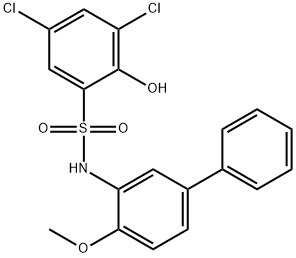ATP citrate lyase (ACL) catalyzes the synthesis of acetyl-CoA and oxaloacetate using citrate, CoA, and ATP as substrates and Mg2+ as a cofactor. The ACL-dependent synthesis of acetyl-CoA is important for the de novo synthesis of fatty acids and cholesterol. Furthermore, as a key enzyme for linking glucose and lipid metabolism, ACL is thought to contribute to the Warburg effect in cancer cells. BMS 303141 is a cell-permeable, 2-hydroxy-N-arylbenzenesulfonamide that inhibits ACL with an IC50 value of 0.13 μM. At an oral dose of 100 mg/kg/day, BMS 303141 has been reported to reduce weight gain and lower plasma cholesterol, triglycerides, and glucose in a mouse model of hyperlipidemia.

